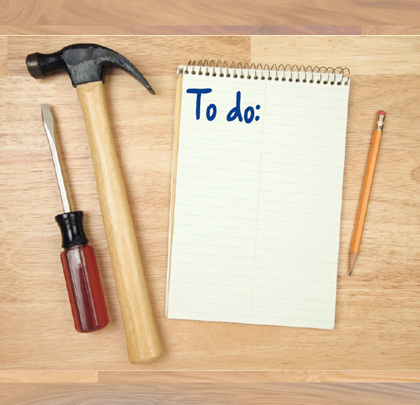As hard as I work every day, shouldn’t I have “arrived” by now? It’s a question that nags at you as you slog through each day, bound to the tyranny of your to-do list, one eye constantly on the clock. It seems all you do is work, but you have only mediocre results to show for it. Once, you had big goals and the confidence to achieve them, but now all you feel is tired, stressed, and overburdened.
If this scenario describes you, you’re not a loser. Like so many others, you’re an unwitting victim of today’s demanding work culture, not to mention bad habits that are sabotaging your best efforts. Read on for a few CEO-worthy tactics that will help you start thriving immediately.
Figure out what’s doable in a day. Turning your whole life around is too big a goal. You can’t sustain many major changes at once. Instead, change your day. Reengineer your routine a little bit at a time, one day at a time, cutting out a small stressor here, and adding in a more productive habit there. The strategy is to make small, doable changes that will, over time, create an unstoppable momentum. Set realistic boundaries. Create goals that can be accomplished in the space of a day. Remember, nearly all problems, challenges, and needs are best faced if they are brought down to the scale of “what can be done right now” by taking on “one small piece” of a difficult situation.
Get big things done before 9:00 a.m. Ever notice how your morning sets the tone for your whole day? As Sir Isaac Newton famously said, “Objects in motion tend to stay in motion.” So if an object (you) gets a groggy, frustrating start, you’ll probably feel sluggish and behind the eight-ball all day long. However, if you start your day with positive and productive ideas, actions, thoughts, and feelings, you’re likely to gain momentum throughout the day.
Own up to your junk hours. “Junk hours” are a little like junk food: While they provide short-term pleasure, they contribute to long-term imbalance and exhaustion. For instance, junk hours might include chasing rabbit trails on the Internet, shooting the breeze with colleagues at the water cooler, checking email in order to avoid doing other work, or even attending an unnecessary meeting. To maximize each day, you need to own up to your junk hours. Identify when you’re going through the motions of work, versus when real work is being done. Don’t be ashamed that your junk hours exist, because everybody needs to take breaks and shift gears. Your task now is to exchange your low-value “junk” activities for ones that build greater health and value into your workday.
Instead of adding to your to-do list, build a new pattern. The changes that build momentum are rooted in decisions, not additional tasks. To build a productive new pattern into your life, you usually won’t have to add new tasks to your day. Instead, simply do what you are already doing, or want to do, in a way that becomes habitual. For instance, if you want to wake up an hour earlier so that you can jump-start the day, you simply have to change the time your alarm rings and the time you go to bed. If you want to be more productive at work, you might have to replace aimless procrastination with scheduled breaks. In both cases, you’re changing the way you perform existing tasks, not adding new ones.
Start with one thing. Then add another. Then another. Don’t take on more than you can handle. Break each goal down to its smallest components and pick one of them to tackle. Pursue this change until it becomes a habit, then move on to the next one. Start with one thing and don’t add another until you’re ready. Positive motion creates positive emotion.
Make a big-box checklist. It’s a given that you have a to-do list. Maybe it’s on paper, on your smartphone, or just in your head … but you have one. It’s also highly likely that your list isn’t as useful as it could be. Too often, you get stuck doing the urgent instead of the important. Here’s a solution: Make an actual, on-paper checklist each afternoon for the following day or each morning. Put a box by each task—the more important that task is for you to complete that day, the bigger its box should be. Then focus first on big-box tasks. At the end of the day, if most of them have checkmarks, it’s generally been a good day.
Seek to serve, not shine. To some extent, it’s human nature to look out for Number One. We all want to rack up accomplishments, receive accolades, and garner recognition. But in many situations, the desire to shine can cause you to get in your own way. The key to shining is putting others first. People who channel their efforts toward making others’ lives easier are nearly always respected, included, and considered valuable. When you help others reach their goals and become their best, you’ll usually find that the same things happen to you.
What is one small change you can make right now to start rewiring the patterns that define your life?
■ ■ ■
[divider]
For More Information: Andy Core is the author of Change Your Day, Not Your Life: A Realistic Guide to Sustained Motivation, More Productivity, and the Art of Working Well. He is an award-winning lecturer, author, television host, and expert in human performance and motivation. Voted a 2012 Top 5 Global Health/Healthcare Speaker by Speakers Platform, Andy has a master’s degree in the science of human performance and has spent the past 23 years mastering what it takes to become energized, healthy, motivated, and better equipped to thrive in today’s hectic society.
Modern Contractor Solutions, MAY 2014
Did you enjoy this article?
Subscribe to the FREE Digital Edition of Modern Contractor Solutions Magazine!


